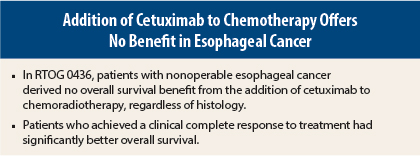More data have emerged that discount the potential for benefit with epidermal growth factor receptor (EGFR) inhibitors in esophageal cancer. The latest comes from the RTOG 0436 randomized phase III trial in patients with nonoperable esophageal cancer, the results of which were presented at the 2014 Gastrointestinal Cancers Symposium.1
“The addition of cetuximab [Erbitux] to weekly cisplatin/paclitaxel and daily radiation therapy did not improve overall survival in patients with esophageal cancer,” said Mohan Suntharalingam, MD, of the University of Maryland Marlene and Stewart Greenebaum Cancer Center, Baltimore. “These data add to the growing evidence that currently available EGFR inhibitors fail to improve survival of unselected patients treated nonoperatively with concurrent chemoradiation.”
Study Design
The study enrolled 344 patients with adenocarcinoma or squamous carcinoma. Approximately 80% of patients had stage T3/T4 disease and 20% had stage T1/T2 disease. Two-thirds of patients had nodal involvement. Both arms received weekly paclitaxel at 50 mg/m2 and cisplatin at 25 mg/m2 with daily radiation to 50.4 Gy (1.8 Gy per fraction). In the experimental arm, patients also received cetuximab at 400 mg/m2 on day 1 followed by 250 mg/m2 of cetuximab weekly. The primary endpoint was an improvement in overall survival with the addition of cetuximab to concurrent chemoradiotherapy.
Study Outcomes
At 2 years, the overall survival rate was 44% for the cetuximab/chemoradiotherapy arm and 41.7% for the chemoradiotherapy-alone arm, for a hazard ratio (HR) of 0.92 that was not statistically significant (P = .70), he reported.
By histology, overall survival was also similar. Clinical response rates (assessed at endoscopy 6 to 8 weeks after completion of treatment) also were not improved with the addition of cetuximab, regardless of histology. Complete responses were observed in 56% of all patients with adenocarcinoma who received cetuximab vs 59% of the control arm (P = .72), and in 59% of squamous cell patients who received cetuximab vs 64% of the control arm (P = .78).
“The study did show that achieving a clinical complete response at 6 to 8 weeks improved overall survival,” Dr. Suntharalingam noted. Risk of dying was doubled for patients who did not achieve a clinical complete response.
“By histology, this held up. This provides evidence that endoscopic response rate post-treatment is predictive of overall survival,” he said.
In a multivariate analysis for overall survival, poor performance status (HR = 1.56; P = .0015) and larger lesion size (HR = 1.72; P = .0002) were associated with worse survival.
Still Work to Be Done
Manish A. Shah, MD, Director of Gastrointestinal Oncology at the Center for Advanced Digestive Care at Weill Cornell Medical College, New York, discussed the results at the meeting and noted that the failure of cetuximab in this setting is “consistent with previous results in metastatic disease.” In the REAL3 study, panitumumab (Vectibix) did not improve survival, and in the EXPAND study, cetuximab failed.
It is unclear why EGFR inhibitors are ineffective in esophageal cancers, he said, noting that while EGFR mutations are actually not among the most common mutations in esophageal cancers, EGFR amplification does occur frequently. This may suggest that other downstream redundant pathways may be involved in resistance to this class of targeted therapy. “It’s complicated,” he said.
Ongoing Trials
Dr. Shah suggested that the best approach to improving survival in this disease is to improve response to therapy, optimize targeted therapy, and improve the understanding of tumor biology. These challenges are being tackled in ongoing trials.
Cancer and Leukemia Group B (CALGB) 80803 is evaluating early assessment by positron-emission tomography to assess the efficacy of chemotherapy, with switching of therapy in nonresponders. Targeted therapy with trastuzumab (Herceptin) added to chemoradiotherapy is being evaluated in the Radiation Therapy Oncology Group (RTOG) 1010 study. And RTOG 0436, the study presented at the symposium, has tissue on 85% of patients, which may elucidate those most likely to respond to these drugs, he said. ■
Disclosure: The study authors reported no potential conflicts of interest.
Reference
1. Suntharalingam M, Winter K, Ilson DH, et al: The initial report of RTOG 0436: A phase III trial evaluating the addition of cetuximab to paclitaxel, cisplatin, and radiation for patients with esophageal cancer treated without surgery. 2014 Gastrointestinal Cancers Symposium. Abstract LBA6. Presented January 16, 2014.




